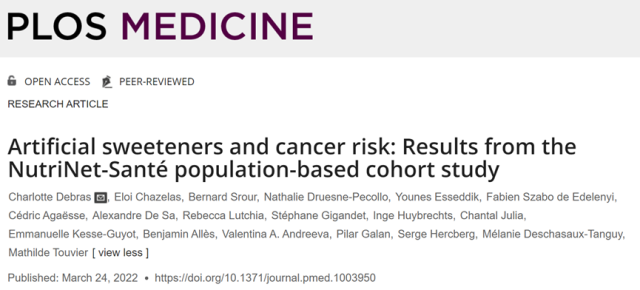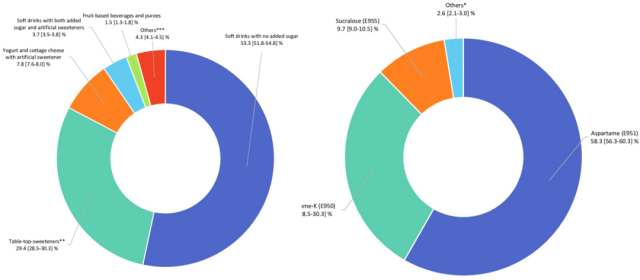A large intake of artificial sweetener is associated with 13% increase in cancer risk
- Normal Liver Cells Found to Promote Cancer Metastasis to the Liver
- Nearly 80% Complete Remission: Breakthrough in ADC Anti-Tumor Treatment
- Vaccination Against Common Diseases May Prevent Dementia!
- New Alzheimer’s Disease (AD) Diagnosis and Staging Criteria
- Breakthrough in Alzheimer’s Disease: New Nasal Spray Halts Cognitive Decline by Targeting Toxic Protein
- Can the Tap Water at the Paris Olympics be Drunk Directly?
A large intake of artificial sweetener is associated with 13% increase in cancer risk
- Should China be held legally responsible for the US’s $18 trillion COVID losses?
- CT Radiation Exposure Linked to Blood Cancer in Children and Adolescents
- FDA has mandated a top-level black box warning for all marketed CAR-T therapies
- Can people with high blood pressure eat peanuts?
- What is the difference between dopamine and dobutamine?
- How long can the patient live after heart stent surgery?
A large intake of artificial sweetener is associated with 13% increase in cancer risk.
Beware of cancer risks behind artificial sweetener! Data from more than 100,000 people for 7.8 years shows that a large intake of artificial sweetener is associated with 13% increase in cancer risk.
There is such a person around Singularity Cake. He wants to be addicted to his mouth but is afraid of high calories. He prefers “sugar-free” and “low-fat” for everything he eats.
Every time he goes to the supermarket, he asks for a box of sugar-free cola, and this cake will hold a box of original Happy Sprite, and come back and drink tons of it together. Even if you eat Golden Arch, you have to customize the package and choose sugar-free drinks, which is really stressful.
But as soon as I saw this article, Singularity Cake couldn’t wait to share it with this little friend – sweetener that you thought were “sweet and healthy” may cause cancer!
Charlotte Debras from the Research Laboratory for Nutritional Epidemiology (EREB), University Paris XIII, and her colleagues found that high intake of artificial sweetener, especially aspartame, was significantly associated with a 22% higher risk of breast cancer , was significantly associated with a 15% increased risk of obesity-related cancers [1].
The article was recently published in the journal Plos Medicine .

In the past two years, the slogan of “sugar removal” has been loudly shouted. Whether from the perspective of health care or anti-aging, sugar-free food is no longer the best choice for diabetics, but has gradually become a mainstream product. Skin care and wellness products that come and go.
As the saying goes, the big tree attracts the wind. Many foods are “sugar-free” by adding sweetener with low calories and high sweetness . As the “sugar-free” turmoil intensifies, people can’t help but worry about the drawbacks of sweetener. After all, how could scientists in the past have thought that people in the future would abandon eating real sugar and cheat their sugar cravings by eating a bunch of sweetener…
Given the harmful health effects of excessive sugar intake, such as weight gain, cardiometabolic disorders, dental caries, etc., the World Health Organization (WHO) recommends limiting routine added sugar intake to less than 10% of daily energy intake [2] ]. However , there are still many controversies about the adverse effects of large intake of sweetener on human health and how to eat them .
Of course, we have to make it clear that sweetener can be divided into artificial sweetener and natural sweetener. Common artificial sweetener are aspartame, acesulfame potassium, sucralose, etc., while natural sweetener include xylitol, sorbitol, mannitol, etc. So far, studies have linked artificial sweetener with obesity, type 2 diabetes, and an increased risk of cardiovascular disease [3], while some studies hold the opposite view [4-6].
However, there has been no more powerful cohort study on the relationship between artificial sweetener and the king of all diseases-cancer.
For the study, Charlotte Debras and her colleagues included a total of 102,865 adults (mean age, 42.2 years) from the French NutriNet-Santé cohort, based on the participants’ self-reported 24-hour food consumption records, medical history, education Data such as degree, lifestyle and weight were analyzed .
Among these 100,000 people, 18.46% (n=18987) had higher intake of artificial sweetener, 18.46% (n=18987) had lower intake of artificial sweetener, and the rest (63.08 %, n=64892) do not eat artificial sweetener.
It is worth noting that the “watershed” differs by gender. For men, the intake of artificial sweetener was higher than 17.44 mg/day, and for women it was 19.00 mg/day .
Among them, sugar-free soft drinks are the main source of intake of artificial sweetener, accounting for 53% .
In terms of types, the artificial sweetener ingested by the participants were mainly aspartame, accounting for 58.3% of the total ; followed by acesulfame potassium, accounting for 29.4% of the total , and other artificial sweetener such as sucralose , sodium cyclamate, saccharin, etc. accounted for a small proportion.

Left: Sugar-free drinks really dominate
Right: Acesulfame and aspartame still eat more
The results of the analysis showed that higher intakes of aspartame and acesulfame potassium were associated with a 15% and 13% increase in overall cancer risk, respectively, compared with no artificial sweetener (HR 1.15, 95%CI 1.03-1.28 ; HR 1.13, 95% CI 1.01-1.26).
Specific to specific cancer types, higher aspartame intake was significantly associated with a 22% increased risk of breast cancer (HR 1.22, 95% CI 1.01-1.48). And there is no escape from “obesity”. Higher intake of aspartame is associated with an increased risk of all obesity-induced cancers (colorectal cancer, stomach cancer, liver cancer, esophagus cancer, ovarian cancer, prostate cancer, etc.) 15% significant correlation (HR 1.15, 95% CI 1.01-1.32).
When no distinction was made, overall , higher intake of artificial sweetener was significantly associated with a 13% increase in overall cancer risk compared with no artificial sweetener (HR 1.13, 95% CI 1.03-1.25; P= 0.002).


Above: Overall cancer risk
Bottom: obesity-related cancer risk
In summary, Charlotte Debras and her colleagues analyzed data from 100,000 people and showed that excessive intake of artificial sweetener (≥17.44 mg/day for men and ≥19.00 mg/day for women) is inextricably linked to increased cancer risk. .
Although the researchers did not explore the mechanism in depth in this study, this is enough to serve as a warning.
In this era of “sugar-free” pursuit, people urgently need to expand their comprehensive understanding of sweetener.
At least when consuming sugar-free food, look at the ingredient list more, and don’t think “sugar-free = harmless”.
How to measure the pros and cons of real sugar, natural sweetener, and artificial sweetener, and how to make trade-offs in the diet, requires scientists to conduct more in-depth and multi-faceted research.
In the end, Singularity Cake reminds everyone that some studies have shown [7] that sweetener can’t actually be “deceived”.
You have fooled your heart and tongue, but you can’t fool your gut, which still uses nerves to inform your brain—this sugar is fake!
However , no matter whether there is sugar or no sugar, with or without steam, Xiao Tianshui is really hard to quit …
references:
[1] https://journals.plos.org/plosmedicine/article?id=10.1371/journal.pmed.1003950
[2] World Health Organization. Guideline: sugars intake for adults and children. Geneva: World Health
Organization; 2015 [cited 2022 Mar 2]. https://www.who.int/publications/i/item/9789241549028.
[3] Azad MB, Abou-Setta AM, Chauhan BF, Rabbani R, Lys J, Copstein L, et al. Nonnutritive sweeteners and cardiometabolic health: a systematic review and meta-analysis of randomized controlled trials and prospective cohort studies. CMAJ. 2017;189:E929–39. https://doi.org/10.1503/cmaj.161390 PMID: 28716847
[4]Toews I, et al. Association between intake of non-sugar sweeteners and health outcomes: systematic review and meta-analyses of randomised and non-randomised controlled trials and observational studies. BMJ. 2019; 364:k4718. https:/ /doi.org/10.1136/bmj.k4718 PMID: 30602577
[5] Pang MD, Goossens GH, Blaak EE. The impact of artificial sweeteners on body weight control and glucose homeostasis. Front Nutr. 2021; 7:598340. https://doi.org/10.3389/fnut.2020.598340 PMID:33490098
[6] Laviada-Molina H, et al. Effects of nonnutritive sweeteners on body weight and BMI in diverse clinical contexts: systematic review and meta-analysis. Obes Rev. 2020; 21:e13020. https://doi.org/10.1111 /obr.13020 PMID: 32216045
[7] Buchanan, KL, Rupprecht, LE, Kaelberer, MM et al. The preference for sugar over sweetener depends on a gut sensor cell. Nat Neurosci 25, 191–200 (2022). https://doi.org/10.1038 /s41593-021-00982-7
A large intake of artificial sweetener is associated with 13% increase in cancer risk
(source:internet, reference only)
Disclaimer of medicaltrend.org
Important Note: The information provided is for informational purposes only and should not be considered as medical advice.



